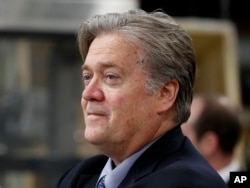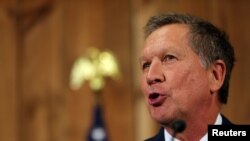President Donald Trump concluded a 17-day working vacation with a return to a changed White House on Sunday evening.
Trump, at the South Portico, said “that’s too bad” when asked by VOA about the U.S. Navy guided-missile destroyer USS John S. McCain being involved in a collision with a merchant ship off the coast of Singapore.
The president, with Vice President Mike Pence alongside, then walked the Colonnade into the newly renovated West Wing.
While Trump was away, a $3.4-million renovation was completed. It included improving the information technology system, placing new carpeting in West Wing rooms, including the Oval Office, and fixing leaks (of the liquid kind) in the press offices.
The most significant alteration, however, was the removal of chief strategist Stephen Bannon from the White House.
Bannon had clashed with members of Trump’s inner circle, including his daughter Ivanka and son-in-law Jared Kushner, who are both employed as advisors to the president.
Trump hopes to move beyond news headlines about his remarks made Tuesday that drew a moral equivalency between white supremacists and counter-demonstrators following a white supremacist rally and violence in Charlottesville, Virginia on August 12.
“Heading back to Washington after working hard and watching some of the worst and most dishonest Fake News reporting I have ever seen!” the president said on Twitter just prior to his scheduled return to the White House.
No one from the administration appeared on the Sunday television news talk shows to defend the president or discuss the ramifications of Bannon’s ouster.
Trump campaign deputy manager David Bossie, on Fox News Sunday, tried to allay concerns among conservatives that West Wing feuding is damaging the president’s political agenda.
“In every presidency there are factions,” he said. There’s no difference here.”
Ohio Governor John Kasich, a Republican, who has been critical of the president on a number of issues, appearing on CNN’s State of the Union, said he wanted to see Trump “get it together.”
“The changes have to stop, and we have to have a team,” Kasich said. “You can't keep putting new people in the lineup and think you're going to win a world championship.”
Civil tension in the United States has increased since Trump’s Tuesday remarks.
An estimated 40,000 counter-demonstrators showed up in Boston on Saturday to confront far-right groups staging a so-called “free speech rally.” Only a few dozen, at most, showed up for the event, which ended early. Police say about 30 arrests were made for disorderly conduct and assault.
The president is scheduled to be in Phoenix, Arizona on Tuesday evening for a political rally. The city’s mayor has asked Trump to postpone the event, fearing the possibility of clashes between ultra-conservative supporters of the president and those who plan to protest the president’s visit.
At the event, Trump is widely expected to make remarks about Arizona politics as well as talk about his plans build a border wall. The president has criticized both of the Republican senators from the state and is considering issuing a pardon for the 85-year-old former Maricopa County Sheriff Joe Arpaio, a hardliner on immigration, who was recently convicted of contempt of court by a federal judge.
Ohio Governor Kasich said he hopes Trump would use the Phoenix event “as an opportunity to say something that's going to bring people together.”
Before heading to Arizona, the president on Monday evening will go to a nearby army base in northern Virginia to announce his decision on force levels for the U.S. military in Afghanistan.
The subject was discussed Friday at the Camp David presidential retreat in Maryland where the president, along with Vice President Mike Pence, met with Defense Secretary James Mattis, the National Security Advisor, Lt. General H.R. McMaster, and others.
The president earlier this year authorized the defense secretary to determine the troop numbers for Afghanistan. Mattis is believed to favor sending several thousand more American troops to strengthen the effort to advise Afghan forces as they push back against gains made by the Taliban, the Islamic State and other militant groups.
On his way to the Middle East on Sunday, Mattis told reporters he “was not willing to make significant troop lifts until we made certain we knew what was the strategy, what was the commitment going in. In that regard, the president has made a decision, as he said. He wants to be the one to announce it to the American people, so I'll stand silent until then.”








